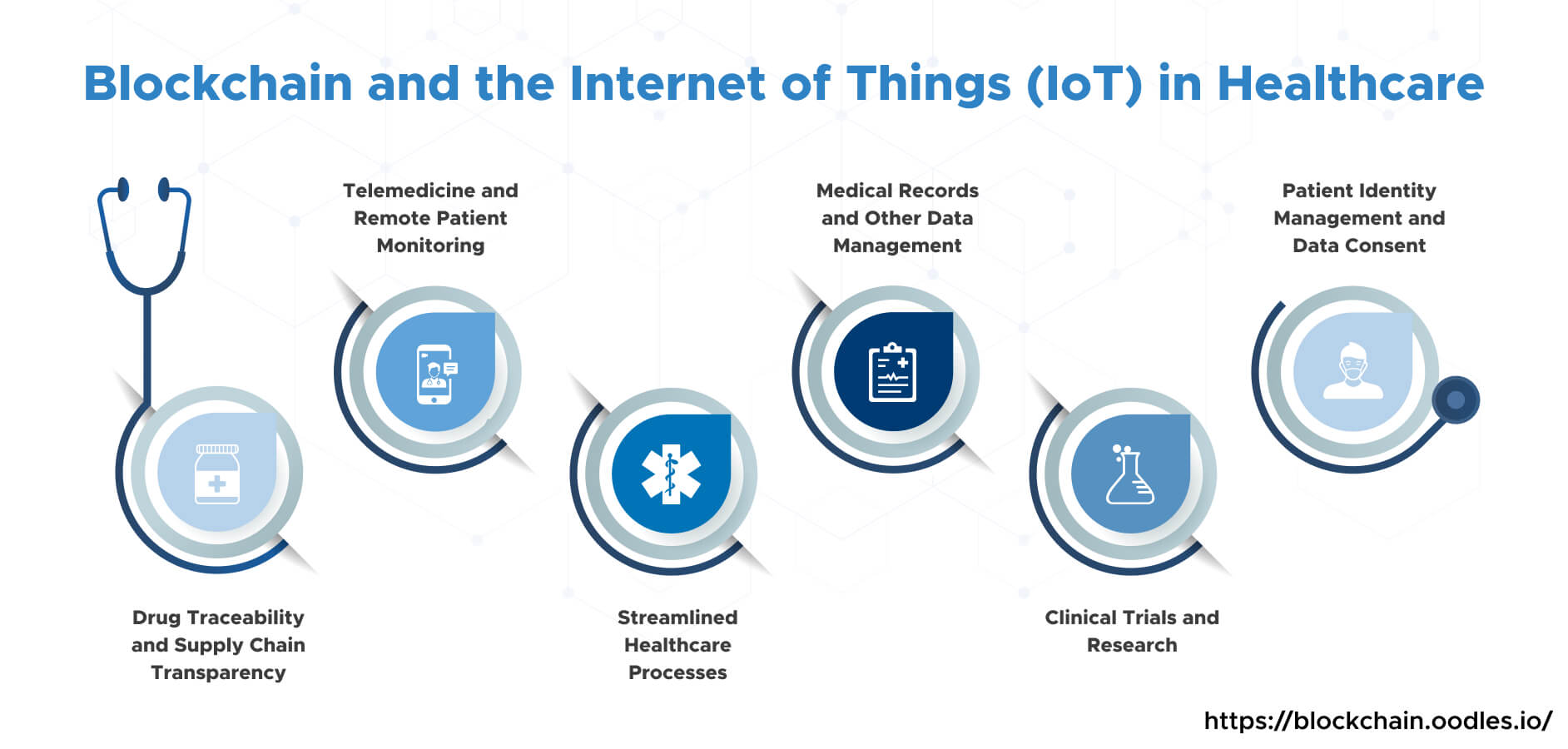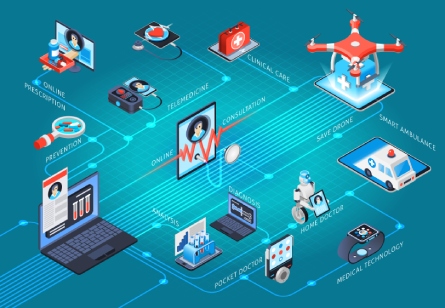-
The integration of blockchain and the Internet of Things (IoT) is propelling the healthcare sector into an era of unprecedented transformation. The convergence of these two cutting-edge technologies holds immense potential to redefine patient care, data management, and operational efficiency. In this comprehensive article, we delve into the various ways in which IoT and blockchain for healthcare can reshape the landscape of the medical sector.
Blockchain and Internet of Things (IoT) in Healthcare
Blockchain and the Internet of Things (IoT) stand as flourishing sectors within Information Technology (IT). These domains find applications across diverse industries like supply chain, logistics, and automotive.
Owing to IoT devices' limited processing and storage capabilities, user medical data often finds its place within centralized repositories or cloud environments. Unfortunately, this centralized approach compromises data control, posing security risks and creating single points of vulnerability. An innovative resolution is essential to enhance data sharing securely.
Here, the merger of blockchain and the Internet of Things in healthcare holds immense promise for the medical sector. This fusion can bolster efficiency, security, transparency, and business opportunities. This integration can enhance treatment processes, diagnosis precision, and data security by facilitating the efficient sharing of Electronic Health Records (EHRs).

Suggested Read | EHR (Electronic Health Records) Management with Blockchain
Drug Traceability and Supply Chain Transparency
The pharmaceutical supply chain often grapples with counterfeit drugs and compromised drug quality. IoT-enabled sensors can monitor conditions during drug transport. While blockchain ensures an immutable record of each drug's journey, from manufacturing to patient use.
This transparency combats counterfeiting, guarantees drug authenticity, and bolsters patient safety.
Check It Out | Tracking Counterfeit Drugs With Blockchain Healthcare Solutions
Telemedicine and Remote Patient Monitoring
The integration of blockchain and the Internet of Things in healthcare can also opens up new possibilities. IoT-connected wearables and medical devices facilitate remote patient monitoring and telemedicine consultations. The generated data, securely transmitted through blockchain, enables healthcare providers to make informed decisions and offer timely interventions, irrespective of patient location.
Streamlined Healthcare Processes
Smart contracts, executable code on a blockchain, automate processes triggered by predefined conditions. In healthcare, these contracts can streamline insurance claims processing, medication adherence monitoring, and patient consent management. Smart contracts enhance efficiency and reduce errors by removing intermediaries and reducing administrative complexities.
Explore More | Satoshi Nakamoto’s Last Email Reveals Bitcoin Creator’s Thoughts
Medical Records and Other Data Management
There's a need to overhaul the conventional approach to medical record monitoring. The integration of the Internet into healthcare systems has significantly boosted efficiency. Internet-enabled smart devices simplify data storage and processing, accommodating diverse formats like audio, images, and text.
The incorporation of IoT in healthcare serves to optimize medical resource utilization and elevate patient health standards. IoT devices are prolific data generators, capturing patient vitals, medication schedules, and treatment adherence.
Integrating these data streams into a blockchain-based electronic health record (EHR) system ensures a comprehensive, up-to-date medical history that authorized healthcare providers can access securely. This interoperability streamlines diagnoses, improves care coordination, and enhances patient outcomes.
Also, Visit | Blockchain in Healthcare Data Management | Impact, Benefits, and Use Cases
Clinical Trials and Research
IoT devices play a pivotal role in collecting real-time data for clinical trials, ensuring accurate and continuous patient monitoring. Blockchain's transparent ledger safeguards trial data from manipulation.
It enables researchers to validate trial results with confidence. This innovation accelerates research, drug development, and medical advancements.
Patient Identity Management and Data Consent
Blockchain's decentralized identity management ensures patients have control over their health data. IoT devices can be used for biometric authentication, strengthening patient identification. Patients can grant consent for data sharing with specific healthcare providers, ensuring data privacy and ethical use.
You May Also Like | AI and Blockchain for Technological Advancements in Healthcare
Conclusion
In the contemporary landscape, IoT technology finds application in diverse sectors, including agriculture, healthcare, and smart cities. In healthcare, businesses can utilize IoT for tasks such as continuous patient health monitoring and drug traceability. Nevertheless, IoT confronts security challenges, which can be mitigated by synergizing it with blockchain.
By merging blockchain with healthcare, the integrity and confidentiality of patients' sensitive health records can be safeguarded, ensuring protection against tampering and unauthorized access.
Interested in developing blockchain-based healthcare solutions? Discuss your project needs with our blockchain experts today!














